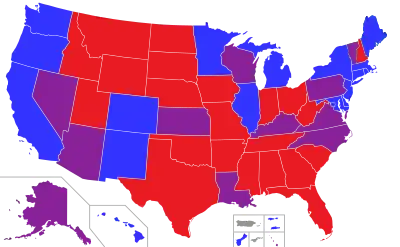List of United States state legislatures
This is a list of United States state legislatures. Each state in the United States has a legislature as part of its form of civil government. Most of the fundamental details of the legislature are specified in the state constitution. With the exception of Nebraska, all state legislatures are bicameral bodies, composed of a lower house (Assembly, General Assembly, State Assembly, House of Delegates, or House of Representatives) and an upper house (Senate). The United States also has one federal district and five non-state territories with local legislative branches, which are listed below. Among the states, the Nebraska Legislature is the only state with a unicameral body. However, three other jurisdictions – the District of Columbia, Guam, and the U.S. Virgin Islands – also have unicameral bodies.
| This article is part of a series on the |
| Politics of the United States |
|---|
 |

The exact names, dates, term lengths, term limits, electoral systems, electoral districts, and other details are determined by the individual states' laws.
Party summary
| Republican | 28 |
| Democratic | 19 |
| Split[nb 1] | 3 |
| Total | 50 |

Note: A party with a numerical majority in a chamber may be forced to share power with other parties due to informal coalitions or may cede power outright because of divisions within its caucus.
| Republican trifecta | 22 |
| Democratic trifecta | 17 |
| Democratic governor/Republican legislature | 6 |
| Republican governor/Democratic legislature | 2 |
| Democratic governor/Split legislature | 1 |
| Republican governor/Split legislature | 2 |
| Total | 50 |
State legislatures
Federal district and territorial legislatures
| Federal district or territory | Governor | Name | Lower house | Upper house | ||||||
|---|---|---|---|---|---|---|---|---|---|---|
| Name | Size[1] | Party strength | Term (years) | Name | Size[1] | Party strength | Term (years) | |||
| Governor | Fono | House of Representatives | 20 | NP 20[nb 13] | 2 | Senate | 18 | NP 18 | 4 | |
| Mayor | Council | (Unicameral) | Council | 13 | D 11–0, 2 ind. | 4 | ||||
| Governor | Legislature | (Unicameral) | Legislature | 15 | D 9–6 | 2 | ||||
| Governor | Commonwealth Legislature | House of Representatives | 20 | Coal. 16–4[nb 14] | 2 | Senate | 9 | Coal. 5–4[nb 15] | 4 | |
| Governor | Legislative Assembly | House of Representatives | 51 | 26 PPD, 21 PNP, 2 MVC, 1 PIP, 1 PD[nb 16] | 4 | Senate | 27 | 12 PPD, 10 PNP, 2 MVC, 1 PIP, 1 PD, 1 ind.[nb 16] | 4 | |
| Governor | Legislature | (Unicameral) | Legislature | 15 | D 11–0, 4 ind. | 2 | ||||
See also
- Political party strength in U.S. states
- Comparison of U.S. state governments
- United States state legislatures' partisan trend
- National Conference of State Legislatures
- List of current United States governors
- List of U.S. state representatives (Alabama to Missouri)
- List of U.S. state representatives (Montana to Wyoming)
- List of U.S. state senators
- List of current United States State Legislatures
Notes
- "Split" in the sense that each of the two chambers are controlled by a different party (e.g., a Democratic Senate and Republican House) or one chamber is evenly split between parties and thus "hung". The Nebraska Legislature is nonpartisan, and although the majority of members are registered members of the Republican Party, Nebraska's lack of formal party structure within its rules means that no single political party controls the Nebraska Legislature to the extent that political parties often control legislative bodies in other US states. However, for the general purposes of this information, understanding the Nebraska Legislature to be Republican-controlled is a merited oversimplification.
- The majority in the Alaska House of Representatives is held by a coalition of 19 Republicans, 2 Democrats and 2 independents. The minority consists of 11 Democrats, 4 independents and 1 Republican. There is also 1 Republican part of neither group.
- The majority in the Alaska Senate is held by a coalition of 9 Democrats and 8 Republicans. There are 3 Republicans outside the caucus.
- The Constitution of California names it the "California Legislature", but the legislature brands itself as the "California State Legislature".
- The Constitution of Louisiana vests legislative authority in "a legislature, consisting of a Senate and a House of Representatives," and refers to it as "the legislature" throughout, without officially designating a term for the two houses together. However, the two bodies do use the term "Louisiana State Legislature" in official references to itself.
- There are 3 additional non-voting seats allocated to sovereign tribal nations within Maine. Since 2018, only one seat (belonging to the Passamaquoddy) is filled; the tribal representative is a Democrat but is not counted in this total.
- When Nebraska switched to a unicameral legislature in 1937, the lower house was abolished. All current Nebraskan legislators are referred to as "Senators", as the pre-1937 senate was the retained house.
- Nebraska's legislature is de jure nonpartisan but senators' political affiliations are publicly known and voting often happens along party lines; the de facto composition is given here.
- The Constitution of Utah names it the "Legislature of the State of Utah", but the legislature brands itself as the "Utah State Legislature".
- The majority in the Vermont House of Representatives is held by a coalition of 104 Democrats, 5 Vermont Progressives and 3 independents. The minority consists of 37 Republicans and 1 Libertarian.
- The majority in the Vermont Senate is held by a coalition of 22 Democrats and 1 Vermont Progressive. 7 Republicans make up the minority.
- The Constitution of Washington names it "the legislature of the state of Washington", but the legislature brands itself as the "Washington State Legislature".
- The American Samoa House of Representatives also includes one nonpartisan non-voting delegate representing Swains Island.
- The majority in the Northern Mariana Islands House of Representatives is held by a coalition of 4 Democrats and 12 independents. The minority consists of 3 Republicans and 1 Independent.
- The majority in the Northern Mariana Islands Senate is held by a coalition of 3 independents and 2 Democrats. The minority consists of 4 Republicans.
- The parties of Puerto Rico are separate from the Republican and Democratic parties.
References
- The Book of the States (53 ed.). The Council of State Governments. January 7, 2022. Retrieved July 10, 2022.